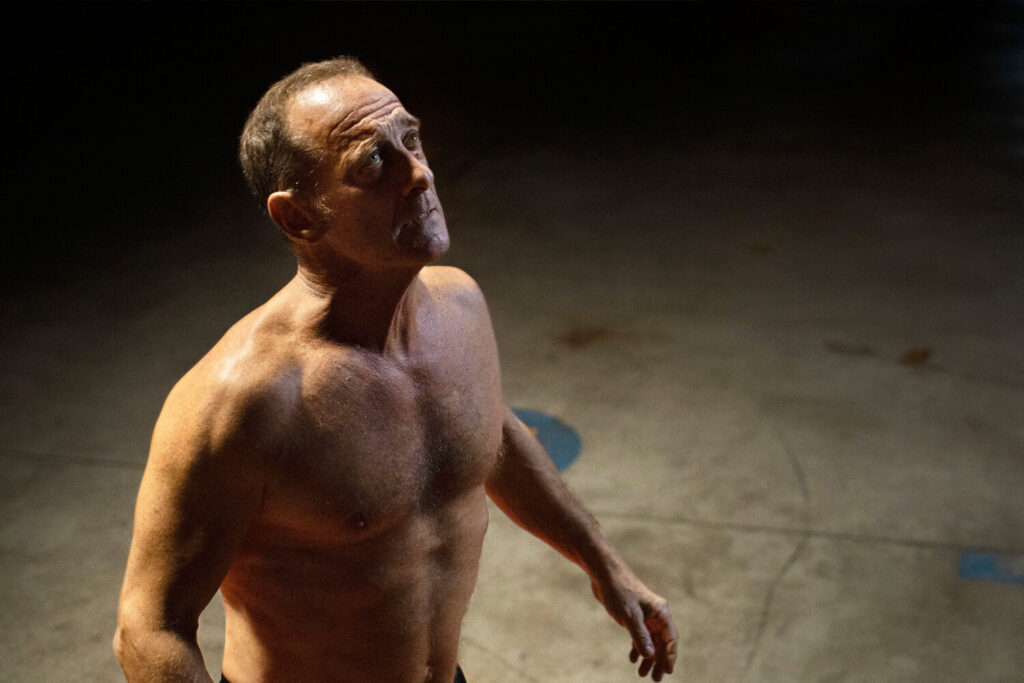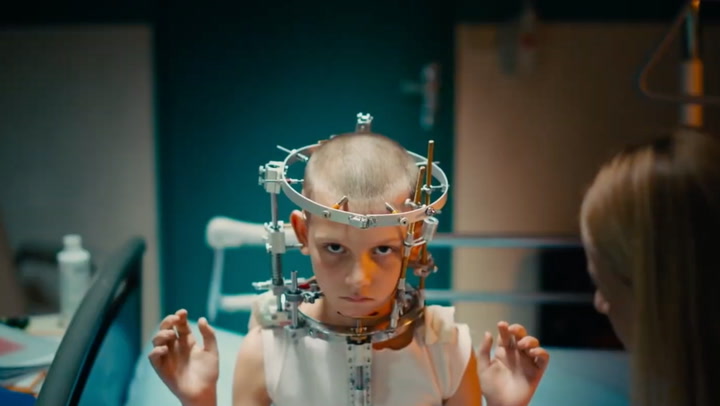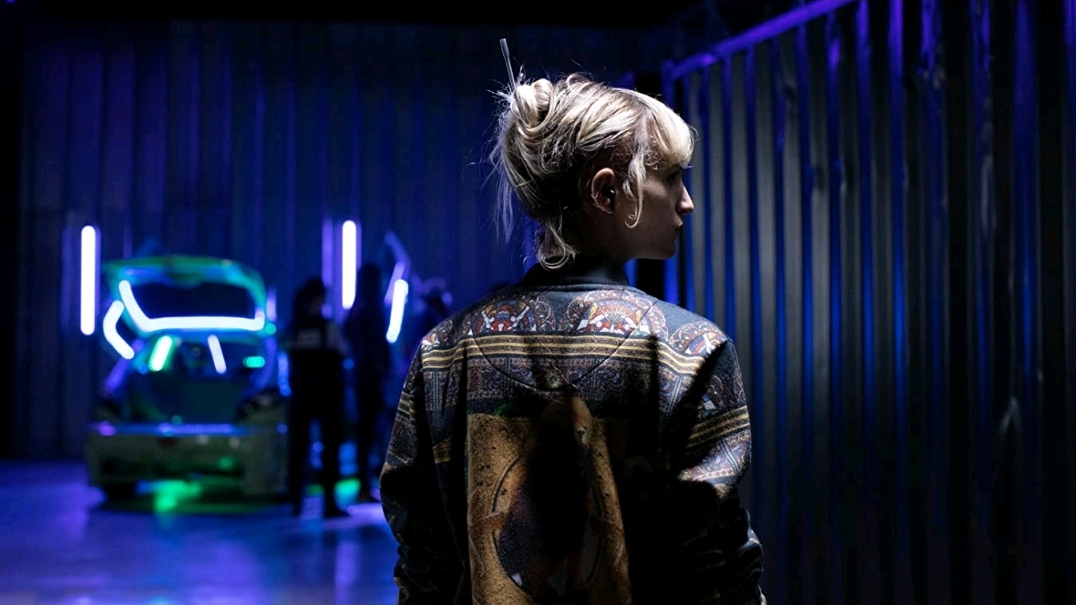Julia Ducournau’s film, Titane, released in 2021, is one of those films that leaves an indelible mark every time you watch it. A film that refuses to remain static on a surface level of shock value. Mixing horror, a healthy dose of black humor, and human qualities, with fetishism and absurdity, Titane touches profound subjects: identity, gender fluidity, love, loss, family, and fragility in the human body. Ducournau’s vision is thrillingly hyper-kinetic and at times gruesome, but it is drenched in raw emotional clarity.
Her film, a fiery, neon-soaked nightmare, comes accompanied by a haunting score that blends techno beats with moments of J.S. Bach’s choral music. That is why Titane was touted to be the film version of the body horror David Cronenberg’s Crash and the machine-love obsession John Carpenter’s Christine, something new and bold in the cinematic world, led by phenomenal performances from its two lead actors.
What makes Titane such a strong experience is not only shocking moments but rather striking visual storytelling and deeply layered emotional core. The essay discusses how, in Ducournau’s narrative of gender, identity, and loss, key character analysis and mature emotional clarity are accomplished through the director’s work.
Duality of Identity

It revolves around the character of Alexia by Agathe Rousselle, and the heart of it all comes centered around Titane, to which she adheres. She burrows so deep into a machine sexuality with her machines that seems to be cemented only in a horrifying car crash that leaves her with a titanium plate in her head. She becomes symbolic in her relationship with machines as a divorce from the organic and human world. Ducournau uses Alexia’s character as a canvas to paint themes of bodily transformation and disconnection, amplified through her violence and cold indifference.
This warped individual throughout the film struggles with her humanity in line with her sexual attraction to cars and other mechanical objects combined with her violent nature. The movie opens with a disgusting and erotic dance where Alexia dances on top of the car, objectifying herself but at the same time empowering her through mechanized movements. She navigates life as if she is a machine herself, killing with impunity, and pays no regard to human life. This disconnection is also reflected in her internal struggle with her gender identity since Alexia’s body also becomes the site of horror and transformation.
Still, Alexia’s presence in the film by Ducournau goes beyond shock and gore. Alexia serves as a metaphor for rebirth in the director’s eyes: her brutal activities are a cleaning mechanism that will lead to her transformation. Her final pregnancy, which was impregnation by a car, is the best yet saddest interpretation of her battle with human and mechanical identities. The fusion between the flesh and the metal in Alexia’s body and the potential pregnancy that may accompany it then serve as a signifying identity of synthesis, identity transformation, and fluidity while creating an acceptance of the self. At the end of the film, her transformation is not only physical but also emotional as she slowly goes back to the idea of family and unconditional love.
The Vulnerability of Masculinity and Grief

One of the most emotive centers of the film probably belongs to Vincent, played by Vincent Lindon. He is a man who contrasts Alexia’s placental coolness with his vulnerability and pain. A fire chief who lost his son years back, Vincent is a man defined both by emotional fragility and by physical fragility. Hyper-masculinity packaged in steroid injections for the maintenance of body mass as well as obsessive control over his physical structure serves as a comfort blanket that deals with his grieving self and longing for human connection.
Ducournau depicts Vincent as belonging to the family and having a stake in remaining stuck to his loss. Deeply emotional wounds expressed through hugs with Alexia, whom he believes to be his lost son, reveal the vulnerabilities that the semblance of hyper-masculinity masks over him. This same bodily transformation he exercises over himself, through cruel exercise and steroid injections parallels Alexia’s bodily metamorphosis, though he is born out of desperation to feel in control.
The interaction of Vincent with Alexia, especially after Alexia has taken up the identity of his son, explores his capacity for unconditional love. He becomes a father again, not because of the biological connection but because of the deep emotional need to care for someone. Moving to the poignancy, Vincent says, “You are my son, no matter what.” This captures the emotional maturity in Ducournau’s storytelling: Titane is at its core about love that transcends identity, body, and social expectations (you got a competition Interstellar!).
The character of Vincent reflects the more profound themes of love and acceptance within the film. He is on a journey, part of which is of both bereavement and loss but also an element of finding hope in things in which he least expected to find it. The emotional healing through Alexia’s metamorphosis has led to a relationship that goes above what could probably fit within the boundaries of gender or family.
Themes of Gender Fluidity and the Human Body

The fluidity of identity concerned Titane and, most vitally related to this text, gender identity. An example of this is when Alexia transforms to become Vincent’s son. Her gender is now vague. She ties up her chest, gives herself a shave, and dresses herself as the son, altogether accepting a new gender role. This is not just a disguise, but that flux of gender identity and how roles are assumed and disowned.
The treatment of the body as a machine by Ducournau also finds its association with gender fluidity. Alexia’s hybrid body-flesh-and-metal is an analogy of the deconstruction of any classical tenets about gender. The pregnancy, though mechanical and unnatural, blurs the lines of both the male and female, human and machine even more. And this movie invites the audience to question those limits of human flesh, identity, and what it means to be “whole.”
In Titane, the human body is a site of horror and transformation. The use of body horror by Ducournau is never gratuitous but rather portrays how our bodies can subdue us, change us, and eventually create our identities. Alexia’s body is incessantly in flux, and her pregnancy is a grotesque yet poignant metaphor for the birth of a new identity. In this regard, Ducournau masterfully combines body horror with more profound emotional turmoil around questions of identity and transformation.
Visual Language and Cinematic Influences

Focus, artfulness, and harrow; focusing on everything without using a single word, Ducournau’s direction is often like this. Her visual language is striking, with bold color schemes, sharp contrasts, and fluid movements of the camera emphasizing the visceral quality of the narrative. Metallic coolness mixed with neon vibrancy forms the aesthetic of the film, reflecting humanity pitted against the machine, and defining its narrative.
Her use of black humor absolutely literally throughout the movie adds a layer of levity to the otherwise dark material. Various situations, for example, the impregnating aspect of the car or her attempts at concealing her gender identity, are presented in what could be called an absurd, twisted sense of humor that pays emphasis on the surreal nature of the movie.
Ducournau freely borrows influences, ranging widely but most prominently from David Cronenberg and John Carpenter. The body horror in Titane very much brings to mind Cronenberg’s Crash (1996), where the merging of flesh with metal becomes the definitive theme. Similarly, Carpenter’s Christine (1983), where a man’s obsessions consist of a killer car, is replicated through Alexia’s fixation with machinery.
Despite these influences, one is still able to tell that Ducournau’s work happens to be behind the camera. Mixing genres such as horror, drama, and absurdist comedy with an exceptionally cohesive narrative is a show of her prowess as a filmmaker. She has managed to craft a film that feels deeply personal in its study of love, loss, and identity, a film that echoes well in universal terms.
It is a film that becomes richer with each viewing, its thematic depth and emotional resonance coming to the fore in Ducournau’s striking visual storytelling. Alexia’s transformation journey is physical and emotional, serving as a metaphor for the fluidity of identity, while Vincent’s fragile masculinity finds tender balance in her coldness.
At its heart, Titane is a movie about love, a reflection on family, romantic love, and self-love. Julia Ducournau’s brilliant filmmaking and sensitive approach to issues with identity, gender, and the human body make Titane more than a great work of modern cinema- it’s one which will astonish audiences for years to come.

Chaitanya Tuteja is someone who enjoys sharing his thoughts on books, movies, and shows. Based in India, he appreciates exploring different stories and offering honest reflections. When not reflecting on his favorite media, Chaitanya enjoys discovering new ideas and embracing life’s simple moments.

